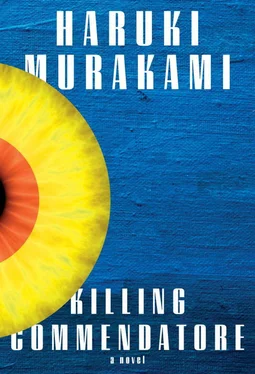A thought suddenly struck me: I wish my sister were here.
If Komi were with me, I’d tell her everything that had happened, and she’d listen quietly, adding an occasional short question. Even with an incomprehensible, mixed-up story like this, I doubt she’d frown or show any surprise. Her calm, thoughtful expression wouldn’t change. And after I finished, she’d pause, then give me some useful advice. Ever since we were little we’d had that kind of interaction. But I realized now she’d never come to me for advice. As far as I could recall, that had never happened. Why? Maybe she didn’t have any major emotional issues? Or maybe she’d decided asking me for advice wasn’t going to help? Maybe both, or half of each.
But even if she had been healthy and hadn’t died at twelve, the intimate brother-sister relationship we had shared might not have lasted. Komi might have ended up marrying some boring guy, gone to live in a town far away, been run ragged by everyday life, exhausted by raising children, lost her sparkle, and no longer retained the energy to give me advice. No one could say how our lives would have worked out.
The problems my wife and I had had might have stemmed from me unconsciously wanting Yuzu to stand in for Komi. That was never my intention, of course, but now that I thought of it, ever since I lost my sister I may have been seeking, somewhere inside me, a substitute partner I could lean on whenever I was struggling. Needless to say, though, Yuzu wasn’t Komi. Their positions, and roles, were vastly different. And so was the history we’d shared.
As I thought about this, I remembered the visit I’d made to Yuzu’s parents’ home in Kinuta in Setagaya in Tokyo, before we got married.
Yuzu’s father was the branch manager of a large bank. His son—Yuzu’s older brother—was also a banker, and worked for the same bank. Both were graduates of the elite economics department of Tokyo University. There seemed to be a lot of bankers in her family. I wanted to marry Yuzu (and of course she wanted to marry me, too), and the visit was for me to convey my intentions to her parents. Any way you looked at it, it was hard to call the half-hour interview I had with her father a friendly visit. I was an unknown artist who worked part-time painting portraits and didn’t make what could be called a regular income. A guy with little in the way of future prospects. Not at all the sort of man a top banker like her father would view favorably. I’d anticipated this ahead of time and was dead set on not losing my cool no matter what he said, or how much criticism he heaped upon me. And I was basically the kind of person who could put up with a lot.
Yet as I listened to her father’s long-winded sermon, a kind of physical revulsion welled up in me, and I lost it. I felt sick, like I was going to throw up. I stood up before he’d finished and said, I’m sorry, but I need to use the bathroom. I knelt down in front of the toilet bowl, trying to vomit up the contents of my stomach. But I couldn’t vomit. Because there was hardly anything in my stomach. Even the gastric juices wouldn’t come out. I took some deep breaths and calmed down. I gargled with water to get rid of the bad taste in my mouth, wiped the sweat from my face with a handkerchief, and went back to the living room.
“Are you all right?” Yuzu asked, looking concerned. I must have looked awful.
“A successful marriage is up to the people involved, but I can tell you, this one won’t last long. Four, five years at the most.” These were her father’s parting words to me that day. (I didn’t respond.) His spiteful words stayed with me, a kind of curse that remained for a long time to come.
—
Her parents never did agree to our marriage, but we went ahead and registered it, and officially became a married couple. By this time, I had very little contact with my own parents. Yuzu and I didn’t have a wedding ceremony. Our friends rented a small place and held a simple party to celebrate, but that was it. (The person who did the most to make that happen was Masahiko, who was always good at taking care of others.) Despite the inauspicious beginning, we were happy. At least for the first few years, we were definitely happy together. For four or five years, we had no problems between us. But then, like a huge cruising ship in the middle of the ocean turning its rudder, there was a gradual change. I still don’t know why. I can’t even pinpoint when things began to move in a different direction. What she hoped for in marriage, and what I was looking for, must have been different, and that gap only grew more pronounced over time. And then, before I knew it, she was seeing another man. In the end our marriage only lasted some six years.
I imagine that when her father learned that our marriage had failed, he’d chuckled to himself and thought, I told you so. (Though we had stayed together a year or two beyond what he’d predicted.) It must have pleased him no end that Yuzu had left me. After we’d broken up, had Yuzu reconciled with her family? I had no way of knowing, and didn’t really want to know, at that point. This was her business, not mine. But still her father’s curse continued to hang over me. Even now, I sensed the vague weight of its presence. I’d been hurt, more than I cared to admit, and had bled. Like the pierced heart of the Commendatore in Tomohiko Amada’s painting.
Late afternoon came on, and with it, the early-autumn twilight. The sky turned dark in the twinkling of an eye, the glossy black crows squawking their way across the valley, heading for their roosts. I went out on the terrace, leaned against the railing, and gazed over at Menshiki’s house across the way. Several mercury lights were on in his garden, the whiteness of the house rising up in the dusk. I pictured Menshiki out there every night, searching through his high-powered binoculars for Mariye Akikawa. He’d purchased that white house, almost by force, for the sole purpose of doing that. Spent a huge amount of money, made a great deal of effort, all for an overly large house that didn’t suit his tastes.
And strangely enough (at least to me it felt strange), I’d begun to feel a closeness to Menshiki, a closeness I’d never felt to anyone before. An affinity—no, a sense of solidarity, really. In a sense, we were very similar—that’s what I thought. The two of us were motivated not by what we had got hold of, or were trying to get, but by what we’d lost, what we did not now have . I can’t say I understood his actions. They were beyond my comprehension. But I could understand what had spurred him on.
I went to the kitchen, took the single malt that Masahiko had given me, and poured a glass on the rocks. I carried the drink out to the living room sofa and selected a record of a Schubert string quartet from Tomohiko Amada’s collection, and put it on the turntable. A piece titled “Rosamunde.” The same music that had been playing in Menshiki’s study. I listened to the music, occasionally clinking the ice in my glass.
The Commendatore never showed up that day. Maybe, like the horned owl, he was quietly resting up in the attic. Even Ideas needed some time off. I didn’t do any painting that day, either. I needed some time off as well.
I raised my glass to the Commendatore.
27
EVEN THOUGH YOU REMEMBER EXACTLY WHAT IT LOOKED LIKE
When my girlfriend came over I told her all about the dinner party at Menshiki’s. Leaving out, of course, any mention of Mariye Akikawa, the high-powered binoculars, and the Commendatore having secretly accompanied me. What I described was the dinner menu, the way the rooms were laid out in the house, the kind of furniture—safe subjects. We were in bed, completely naked, after making love for about a half hour. At first it was hard to relax, knowing that the Commendatore must be observing us, but as we got into it, I forgot all about him. If he wanted to watch, let him.
Читать дальше











